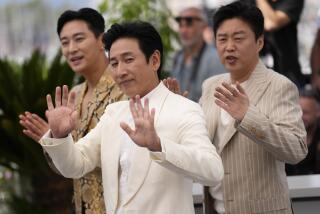Hack attack over Sony’s ‘Interview’ shows risks of naming bad guys
There are few things Hollywood loves — or relies on — more than a good villain.
From Charlie Chaplin’s “The Great Dictator,” which took satirical aim at Adolf Hitler, to countless Cold War-era pictures featuring Russian bad guys and more recent movies centered on Middle Eastern terrorists, filmmakers have routinely taken aim at the enemies of America — and sometimes drawn controversy for it.
But any uproar in the past has easily been eclipsed by the continuing fallout from Sony Pictures Entertainment’s now-shelved comedy “The Interview,” about a fictional assassination attempt on North Korean leader Kim Jong Un.
The film has been linked to a crippling cyber-assault on the studio by hackers who call themselves Guardians of Peace. A day after the group suggested it would attack theaters that show “The Interview,” Sony on Wednesday canceled release of the movie, which had been scheduled to open on Christmas Day.
The firestorm signals that the industry may be entering a new era in which the villains that filmmakers choose to focus on — particularly foreign nationalities or sitting world leaders — will be scrutinized more closely than ever.
North Korea, which has been villainized in several major studio films in recent years, first threatened retaliation over “The Interview” in June, calling it tantamount to “an act of war.” The hackers who took responsibility for the data breach, made public Nov. 24, demanded Sony not release the film.
“We have a long history of attacking other cultures through movies, but we are all interconnected now in ways we weren’t before,” said Wheeler Winston Dixon, film studies professor at the University of Nebraska-Lincoln. “Now something like a cyberattack is possible.”
As the leaks continue — with more confidential computer files disbursed on a near-daily basis — film producers and studio executives said they do not expect any major studios to move forward with projects that center on North Korea. On Wednesday, the film company New Regency canceled “Pyongyang,” a Steve Carell-starring comedy set in North Korea. The film, based on the graphic novel by Guy Delisle, was to have been directed by Gore Verbinski.
“I’ve got to believe that this will spook anybody from considering making the North Koreans bad guys in a film,” movie producer Bill Gerber said of the hacking on Sony before “The Interview” was pulled. “Unless you were dealing with something that was fact-based and very compelling, it might not be worth it.”
Filmmaker Judd Apatow lamented that the current atmosphere of hyper-sensitivity could rob Hollywood of its ability to center films on real-life villains.
“Are we now living in a world where we’re not allowed to say that these are bad people? Are we not allowed to make a movie where ISIS is the bad guy now?” asked Apatow, whose credits include “Knocked Up” and “This Is 40.”
For more than a decade, North Korea and its leaders were reliable fodder for Hollywood. Movies including “Die Another Day” (2002), “Team America: World Police” (2004), “Stealth” (2005), “Salt” (2010) and “Olympus Has Fallen” (2013) all depicted villainous North Koreans.
In the case of “Team America,” an all-puppet comedy from “South Park” creators Trey Parker and Matt Stone, former North Korean leader Kim Jong Il was lampooned mercilessly. But in that case the country’s response was limited to an unsuccessful effort to get the film banned in the Czech Republic.
Observers have speculated that the film did not rankle North Korea to the degree of “The Interview” because of its cartoonish nature. Also, Kim at the time was well into his decades-long reign and secure in his power. His son, Kim Jong Un, assumed control of North Korea only in 2012 and has reportedly purged several political and military chiefs — including family members — to consolidate power.
Until the Sony hacking, North Korea was considered a safe alternative to China when it came to on-screen antagonists.
In 2011, MGM altered its remake of “Red Dawn” — digitally removing Chinese soldiers over concerns about how the film would be perceived in China, the second-largest movie market in the world. Chinese flags and symbols were erased and new dialogue was recorded for the picture, which came out in 2012. In the finished project, the invaders are from North Korea.
USC professor Stanley Rosen, a Chinese film expert, said that for Hollywood, after “China was ruled out, North Korea was the last place left.”
In the wake of “The Interview” debacle, Rosen said, “you are likely to increasingly see the studios make films where the bad guys are not from any known country.”
That approach was initially considered by Sony Pictures and the filmmakers behind “The Interview,” co-directors Seth Rogen and Evan Goldberg.
But after much internal debate, it was decided that the cult of personality around the North Korean leader made him an irresistible satirical target.
“It’s not that controversial to label them as bad,” Rogen said in an interview with The Times in mid-November, days before the hacking attack occurred. “Creatively that was appealing, like, ‘Oh, you can just villainize the guy and it’s OK because he is a villain.’”
There is a recent, high-profile example of a film tweaking a foreign country — and getting away with it. The 2006 comedy “Borat,” which starred Sacha Baron Cohen as a buffoonish TV reporter from Kazakhstan, led to protests in that country. But the matter never boiled over, and the uproar in Kazakhstan dovetailed perfectly into that film’s marketing campaign.
Within hours of North Korea’s official protests over “The Interview,” Rogen and Goldberg got a congratulatory call from Baron Cohen. “We were like, ‘What do we do now?’” Rogen recalled.
Now, with the benefit of hindsight, many have questioned the wisdom of making Kim the film’s villain.
“You have a regime that is super secretive and totally repressive, so making a film like that is a dicey call at best, I’d say,” said Dixon, a film historian.
Of course, “The Interview” is hardly the first film to land a major studio in hot water with a foreign country.
China condemned the 1997 Brad Pitt-starring drama “Seven Years in Tibet,” which depicted a European mountain climber’s relationship with the Dalai Lama. In the film, distributed by Sony’s TriStar Pictures label, Chinese military officers were shown beating up Tibetans.
Around the same time, Walt Disney Co. also became involved in a dust-up with China over its release of Martin Scorsese’s “Kundun,” which also is about the Dalai Lama and the Chinese in Tibet.
“In those days, the [Chinese] market wasn’t that big, so it wasn’t that devastating, but the Chinese definitely retaliated,” Rosen said.
In the case of “Seven Years in Tibet,” Pitt and others connected to the film were banned from entering China, though that decree appears to have been lifted.
Hollywood often mines the headlines for its next diabolical villain. Over the decades, Germany, Russia, Vietnam and other countries have been the source of evil regimes and characters. Middle Eastern countries long were a dependable fount of bad guys for filmmakers, though in recent years Hollywood has moved away from Arab terrorist villains in the face of criticism over stereotyping.
The next villainous state could make itself apparent some day soon. In the interim, what’s the alternative?
“Actually, Russia is the current bad guy, according to most things I read,” observed Gerber, who produced last year’s “Grudge Match.”
Dixon believes American cinema could enter a period of “escapist entertainment.” Indeed, major studios have ramped up their production of superhero fare in recent years: Both Warner Bros. and Walt Disney Co. announced this fall their plans to release 10 or more such pictures apiece over the next half-decade or so.
“We are going to create villains to hate,” Dixon said. “What is Darth Vader? What is ‘Star Wars’ about? Create a whole universe where somebody is absolutely evil... and destroy them.”
After Sony’s cancellation of “The Interview,” the industry could see more self-censorship, said Paul Dergarabedian, senior media analyst for entertainment data firm Rentrak. “Of course we don’t want to see that, but it could happen,” he said.
“There has to be a new perspective — and I’m not talking about self-editing to the point of not being creative,” Dergarabedian said. “But any studio is wise to look at their content.”
For Apatow, “The Interview” episode portends a dark future for Hollywood’s creative community: “There’s so much political correctness that there’s almost no villains left.”
Twitter: @danielnmiller and @joshrottenberg
Staff writers Amy Kaufman, Sarah Parvini and Saba Hamedy contributed to this report.
More to Read
From the Oscars to the Emmys.
Get the Envelope newsletter for exclusive awards season coverage, behind-the-scenes stories from the Envelope podcast and columnist Glenn Whipp’s must-read analysis.
You may occasionally receive promotional content from the Los Angeles Times.








